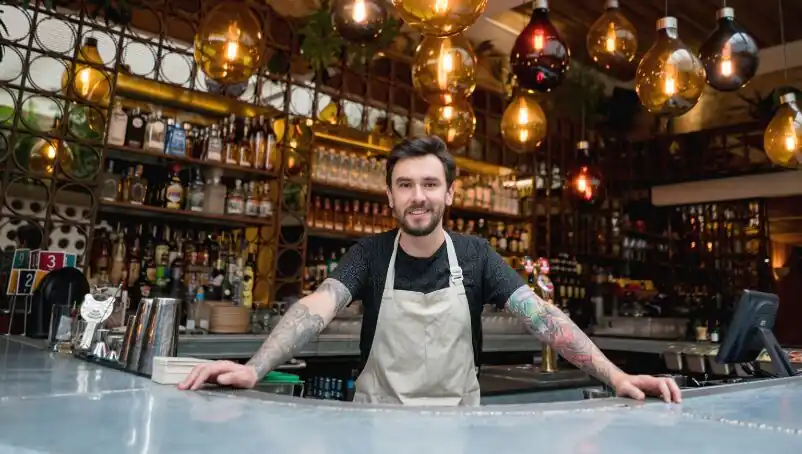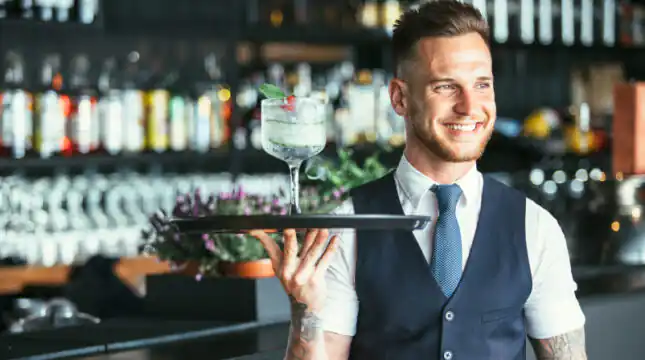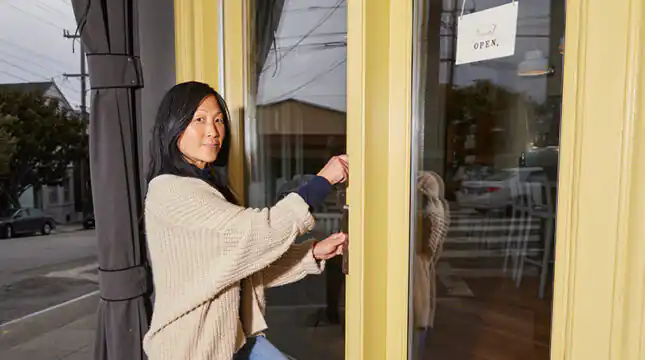Do you need a PA liquor license to sell alcohol?
To serve alcohol in Pennsylvania, you must obtain a liquor license from the Pennsylvania Liquor Control Board (PLCB).
But there’s a twist: While the PLCB regulates the sale of alcohol, each town or city in Pennsylvania can set its own alcohol rules.
This means some places, known as dry municipalities, might ban the sale of certain types of alcohol, while “wet” municipalities allow it. According to the PLCB, around 675 of Pennsylvania’s 2,560 municipalities are partially or completely “dry.” So, even with a license, you can’t sell alcohol everywhere in the state. It’s important to check the rules in your specific location.
How much is a liquor license in PA?
The license fee is pretty reasonable, ranging from $125 to $700. The cost varies based on the license type and population of your municipality. However, the quota system makes it hard to get a new license directly. You’ll likely need to purchase an existing license before going through the approval process.
When a liquor license expires in Pennsylvania, the PLCB reclaims it and auctions it off in a Restaurant License Auction. These auctions happen two or three times a year, and the minimum starting bid is set at $25,000, according to the Liquor Code.
The price can soar, depending on where the license is valid and the license type. For example, in the September 2023 auction, the lowest winning bid was $30,001, and the highest winning bid was $400,000.
Private, person-to-person license sales are not regulated or documented by the PLCB, but previous auction prices for liquor licenses are a good indication of the going rate in your area.
How to get a liquor license in PA
The first step in getting a liquor license in Pennsylvania is finding the license you need. Due to the quota system, you’ll need to find the correct license and ensure it’s valid in the county and municipality you want to do business in.
Several Pennsylvania liquor license types are available. The one you need depends on your business and what kind of drinks you want to sell. For those in the food service industry looking to serve alcohol, there are two licenses you need to know about:
- Eating Place (E) License: Allows for the sale of beer only
- Restaurant (R) License: Allows for the sale of beer, wine, and spirits
Both licenses allow holders to sell up to 192 ounces (commonly two six-packs) of beer to-go, per transaction.
Restaurant (R) licensees can also obtain a Wine Expanded Permit for an additional fee to sell up to three liters of wine for off-premises consumption. However, neither license type allows you to sell open spirits or mixed beverages to-go.
Except in Philadelphia, an E license can be converted to an R license for a one-time fee of $30,000, so long as your establishment meets the requirements for an R license. There’s also an essential consideration about your neighbors: Neighbors within 500 feet, restrictive institutions within 300 feet or other licensees within 200 feet can all file protests against your conversion request.
Both E and R licenses are under quota in Pennsylvania, meaning the number of permits is limited based on county and municipality population. The quota for both E and R licenses is set at one for every 3,000 people.
Once you find the license through a private sale or the Restaurant License Auction, you’ll need to contact the PLCB and start an account on their online PLCB+ system. You can begin the application process of filling out forms and submitting the requested documents there.
The process has many requirements, and you must provide the necessary documentation. You can navigate the system yourself, but many lawyers specialize in liquor license applications if you need clarification or guidance.
Insurance for a Pennsylvania liquor license
Depending on the type of business you own, you may be required to have liquor liability and general liability insurance coverage.
Here are some of the business insurance options that Pennsylvania food and beverage businesses should consider:
Liquor liability insurance
With dram shop laws in place, liquor liability insurance can help cover medical expenses, property damage and even court fees should you be held responsible for a customer’s behavior while intoxicated.
General liability insurance
Working with the public is unpredictable. General liability insurance helps cover you from the most common incidents, including slip and falls to people who aren’t your employees and accidental property damage.
Workers’ compensation insurance
Pennsylvania state law requires that all employees be covered by workers’ compensation insurance, regardless of if they are full-time, part-time, or seasonal workers. If an employee is injured or becomes ill because of their job, this insurance can help cover expenses.
Commercial property insurance
Not only does commercial property insurance help fix your building and repair or replace inventory or gear should something happen, but it can also help pay for the revenue you lose while the repairs are being made.
How long does it take to get a Pennsylvania liquor license?
Due to the quota system, buying a brand-new license is pretty rare. Your best bet is to buy a license from someone selling or wait for a Restaurant License Auction, where you can bid on one.
Once you get your hands on a license and apply for its transfer, the process should take about eight to twelve weeks. However, hiccups occur. “Do not plan a grand opening, gala affairs, or events of any type until you receive notice of the PLCB’s final action — that is, whether the online request is approved,” warns the PLCB in the applicant/licensee requirements guide.
Pennsylvania liquor license requirements
Getting a Pennsylvania liquor license is a detailed process. Here’s a simplified rundown of the documentation you need to be eligible:
- Identification: A driver’s license, passport or similar.
- Residence details: Where you’ve lived for the previous five years, including the police department name responsible for that jurisdiction (for criminal record checks).
- Employment history: Also for the last five years, including dates and employer details.
In addition, you must provide the following for the premises to be licensed:
- Address details: Both physical and mailing address information.
- Property information: Current property owner/lessor name, address and contact information, including the phone number of the premises to be licensed.
- Business structure: Documentation to verify the corporate/business structure of the property landlord.
- Health license: Make sure it’s current and valid.
- Lease documents: Signed and dated lease agreement between you and the current property owner, and any lease assignments, if applicable.
The following financial documentation is also essential:
- Proof of purchase: Evidence to support that the entire purchase price (excluding real estate) is held in escrow.
- Manager’s contract: A copy of the manager’s contract or agreement, if there is one.
- Funding sources: Detail all original sources of funds for the purchase of the license, licensed business, fixtures, equipment, and property. If you bought real estate recently, you must show how you paid for that, too.
- Financial disclosure: An Individual Financial Disclosure Affidavit (PLCB-1842) for each applicant, corporation, limited liability company (LLC), partnership, or club must be prepared.
- Bank statements: Copies of bank statement(s), checking accounts, etc., for the last six months.
This may seem like a lot — and it is. To expedite the application process, gathering all the documentation you need before applying is best.
Business premise requirements
Your establishment must meet specific requirements depending on the type of license you’re after.
For a Restaurant (R) license, your premise must be at least 400 square feet; an Eating Place (E) license must be at least 300 square feet.
In addition, both must meet the following requirements:
- Seating and food for at least 30 patrons.
- 30+ seats must be readily available for the public, not hidden or locked away.
- Seating may not be stacked.
- Dishes and silverware to accommodate at least 30 patrons.
- Current and valid health license issued by your governing municipal authority.
Getting everything in order can feel overwhelming, but being prepared is the key to making the process smoother.
Is a Pennsylvania liquor license transferable?
Yes, there are three types of transfers the PLCB allows:
- Person-to-person: This is for when ownership of a business changes hands, but the location stays the same.
- Place-to-place: This is for when you move the location of your business, but the ownership remains the same.
- Double transfer: For when both the ownership and place of business are going to be different.
The license transfer fee is $550 for place-to-place, $650 for person-to-person, and $700 for a change of person and place.
These transfers are subject to license quotas, so transferring licenses between counties isn’t allowed as a general rule.
Pennsylvania liquor license renewal
Liquor licenses in Pennsylvania are renewed every two years and validated in the off years. While fees are only due on renewal years, both renewals and validations essentially amount to a check-up on your business.
During this check-up, the PLCB contacts your local municipality to see if you’ve received any citations and ensures your taxes have been paid.
Renewal deadlines and years vary depending on where your business is located. A license is considered expired and placed up for auction if it is not renewed.
Pennsylvania liquor license liability and dram shop laws
Pennsylvania has established the Responsible Alcohol Management Program (RAMP) to ensure every licensee and their employees understand and employ responsible alcohol management practices.
RAMP’s two core training programs are Owner/Management and Server/Seller Training.
New managers must complete RAMP training within 180 days of approval of the appointment by the PLCB, and servers/sellers must be RAMP trained within six months of being hired. RAMP certification is valid for two years.
Pennsylvania is a dram shop liability state. That means that should one of your patrons cause injury or death because they became intoxicated in your establishment, your business could be held responsible.
For example, say a group comes to your restaurant to toast a friend’s engagement. They’re having a blast, ordering drinks round after round. But then, on their way home, they’re involved in a car crash that injures someone else. If the driver from the engagement party was over the legal alcohol limit, your business could be sued for the accident. It’s a serious responsibility to keep in mind as a business owner serving alcohol.
How NEXT helps support PA restaurants, cafes, caterers and food service businesses
NEXT has customized business insurance for small business owners. We offer liquor liability insurance alongside our general liability coverage for anyone working in food and beverage.
Get a quote, review your coverage options, purchase insurance, and have your certificate of insurance in about 10 minutes. Manage your policy 24/7 via web or mobile app.
Start a free quote with NEXT.






